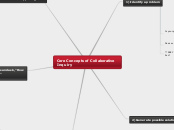Core Concepts of Collaborative Inquiry
1) Identify a problem
Problem is the difference between one's goal state and current state.
Is the Problem a:
Logical Problem
Algorithmic Problem
Story Problem
Rule-Using Problem
Decision Making Problem
Touble Shooting Problem
Diagnosis-Soulution Problem
Case Analysis Problem
Design Problem
Dilemma
Is your problem:
Well-Structured
Ill-Structured
Does everyone see the problem as being the same?
**ARE YOU ABLE TO IDENTIFY THE ROOT PROBLEM AT ALL?
If the Problem is not clear, the solution will be more difficult to come by and will have to be investigated as solutions are proposed.
2) Generate possible solutions
Draw on past experience
All members contribute in brainstorm (collaboration)
Share
Listen
Judge the usefulness of solution
Use domain knowledge
**Does your team possess enough collective domain knowledge?
If not, you will need to: Consult experts, research, carry out surveys, etc. in order to gain more domain knowledge to apply to your inquiry process.
Be Creative
There is no wrong solution, just better or more effective
Research/conduct surveys/gather information necessary for carrying out these solutions
5) Examine what is happening now
Have we chosen the best solution?
Is this solution working?
What needs to be done to maintain results?
Is everyone satisfied with the results?
Does everyone on inquiry team agree that solution is effective?
Celebrate your successes and identify the next problem to solve.
4) Reflect on the results and ask, "How can we make it better?" (Metacognition)
Did this solution generate the desired results?
How could we do even better in solving the problem?
What is missing?
Does everyone on the inquiry team agree that the solution has been reached? (Consensus)
Collect and classify any data collected and reflect on the usefulness of this information.
Is a new solution needed or can we make adjustments to this solution to make it fit?
3) Choose one possible solution, and try it!
Try a solution
Repeat this step until you have found the best solution for your problem.
This step may need to be repeated several times and more solutions (step 2) may need to be generated and tried before the ideal solution is found.
**Remember, each proposed solution is just a solution prototype and only time will tell if the solution is right for the problem.
